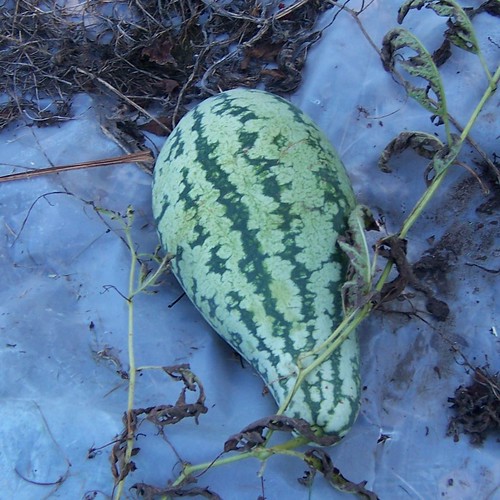
Watermelons are exploding in China creating “fields of landmines” as described by the state controlled media.
The exploding watermelons are caused by misuse of the growth accelerator forchlorfeneron by newbie Chinese watermelon farmers, where skyrocketing prices have caused a rush to harvest the popular summertime fruit this year.
Not surprisingly, Chinese regulations (they have some?) don’t forbid use of the chemical (yes, our plants are drugged too). Misuse of pesticides, fertilizers, and chemicals appear to be rather common in Chinese farming with unusually wet weather this spring serving to blow the whistle on this particular abusive tactic.
This same drug is permitted in the US on kiwi and grapes.
Signs that watermelons have had forchlorfeneron used on them include fibrous or misshapen fruit with more white seeds than black.
No worries, though. The Chinese farmers are making lemonade out of lemons with their exploding watermelons that can’t be sold at market.
They are simply chopping up the ruined, toxic fruit and feeding it to fish and pigs!
What else would you expect from a country that genetically modifies cows to produce human breastmilk, for heaven’s sake?
Sarah, TheHealthyHomeEconomist.com
Source: Associated Press, Fields of Watermelons Burst in China Farm Fiasco








I’m glad I’ve been buying organic grapes (usually from CA) and kiwis. Both are a treat so I only get them occasionally. My toddler loves kiwis so I treat him! Thanks Sarah for another great article.
Crazy does’nt begin to touch this. Greed, now that does. Follow the money
Apologies that this is off topic, but I’m really hoping someone on this forum can tell me (Sarah?) if sweet potatoes are different from white potatoes? Same as? I am trying to avoid anything white, including the starch in white potatoes, but I’ve been told sweet potatoes are different and should be acceptable to my restrictions.
Anyone know?
Thanks!
Yes, sweet potatoes are a starchy vegetable. I don’t know what your restrictions are but sweet potatoes are not permitted on the GAPS diet which restricts all starches, sugars (except honey) and grains.
But sweet potatoes do contain many more nutrients than white potatoes – so if you’re just trying to increase your nutrient intake, sweet potatoes are probably a slightly better choice than white potatoes.
Agreed.
Shoot! Looking for something tasty and nutritious to have with breakfast eggs that’s not a grain or starch. I don’t want to eat broccoli or squash for breakfast.
Thanks for the input!
Try avocado. I have 1/2 avocado with my eggs a couple of times a week and it really fills me up. Another one would be spinach: sauteed in butter with garlic is awesome!
I’m glad I don’t live in China!
But we do, in a sense. Almost all strawberries are imported from China. A few years ago it was discovered that Stoneyfield Farms was purchasing non-organic strawberries from China for their yogurt. People were infuriated and then seemed to forget all about it, as Stoneyfield climbed to be one of the top new companies in America. Go figure.
Why doesn’t this surprise me? This is just another example of abuse of agricultural technology in China, a country that doesn’t seem to be concerned about what their people eat at all. In this country forchlorfeneron is allowed in kiwis and grapes. If that “experiment” goes awry here, whose to say they won’t find a way to utilize the unmarketable fruit?
Misshapen watermelons with many white seeds are a symptom of inadequate bee visits, in other words, poor pollination. Watermelon blossoms need about 1000 grains of compatible pollen delivered and evenly distributed to the three lobes of the stigma. If there are not enough bees, there will not be enough pollen grains delivered, unfertilized (white) seeds will result and the fruit will be misshapen and low quality! It looks as if China, like much of the US, needs to beef up its bee populations. We are poisoning our pollinators.
I think it’s being done on purpose, probably by Monsanto or some other big company who stands to profit by the infertile seeds. I wouldn’t be at all surprised to learn those companies are also behind the reason for the lowered population of bees, and smaller, less active bee colonies.
Very interesting, David. I wonder if the growth enhancer kills the bees which is then the cause of the misshapen watermelons?
Geez. Though I can’t say I’m surprised with what I’ve read about China and their food/industrial practices overall.
Will keep an eye out for misshapen watermelons.
Unreal.
scary! “misshapen fruit and more white seeds than black”….i can only imagine its doing the same thing to our reproductive organs. when will people learn? when there are no more kids being born? organic is even more necessary than ever!
If there is a new way to poison food, the Chinese will certainly jump on it. Next thing you know they will be raising Talapia on human waste…..or have they discovered that neat trick already?
Actually yes, they have. My neighbor told me about this. I will never eat farmed fish again.